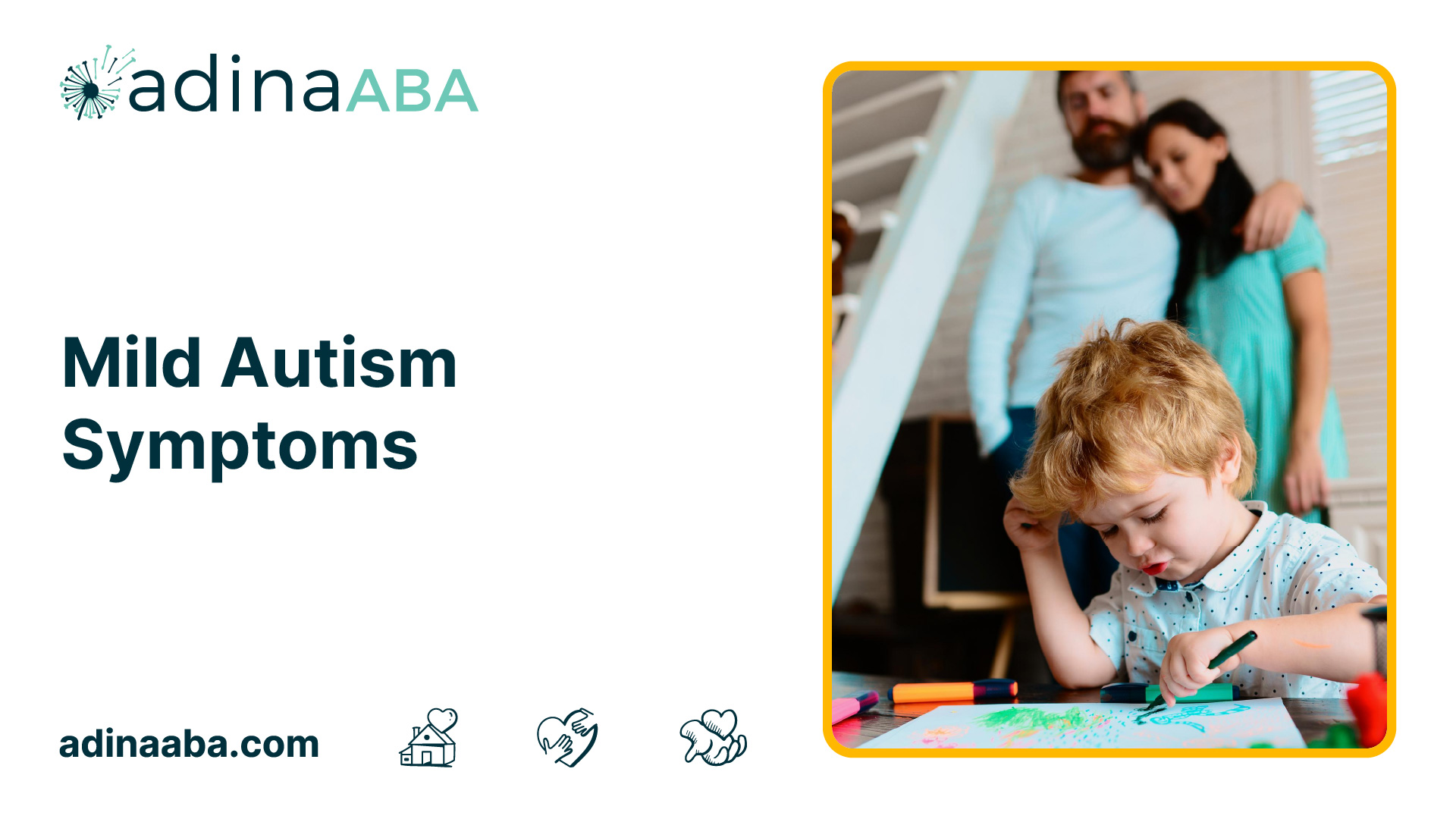Mild Autism Symptoms
.jpg)

Understanding Mild Autism
To better understand mild autism, it's important to grasp the concept of autism itself and differentiate mild autism from other forms of the disorder.
What is Autism?
Autism, also known as Autism Spectrum Disorder (ASD), is a developmental disorder that affects individuals' social interaction, communication, and behavior. It is characterized by a wide range of symptoms and varying degrees of severity. People with autism may exhibit difficulties in social settings, repetitive behaviors, and challenges with verbal and non-verbal communication.
Differentiating Mild Autism
Within the autism spectrum, there is a range of severity levels, including mild autism. Mild autism is often used to describe individuals who have fewer and milder symptoms compared to those with moderate or severe autism. However, it's important to note that even in cases of mild autism, individuals may still face significant challenges and require support and understanding.
Differentiating mild autism from other forms of autism can be a complex task. It often involves considering the severity and impact of symptoms across various domains, such as social interactions, communication, and behavior. While each individual with mild autism is unique, some common characteristics may be observed.
It's important to remember that autism is a spectrum disorder, and individuals with mild autism may display a wide range of abilities and challenges. The severity and impact of symptoms can vary greatly from person to person. Understanding the nuances of mild autism is crucial for recognizing and supporting individuals who fall within this part of the spectrum.
Common Symptoms of Mild Autism
Recognizing the symptoms of mild autism is crucial for early identification and intervention. While autism spectrum disorder (ASD) can vary in severity and presentation, individuals with mild autism often exhibit certain common symptoms. These symptoms can manifest in different areas of their lives, including social interactions, behaviors, sensory sensitivities, and communication.
Difficulty with Social Interactions
One of the hallmark symptoms of mild autism is difficulty with social interactions. Individuals with mild autism may struggle with understanding social cues, initiating or reciprocating conversations, and interpreting nonverbal communication. They may prefer solitary activities and have a limited interest in forming close relationships.
Repetitive Behaviors and Interests
Repetitive behaviors and interests are another characteristic of mild autism. These behaviors can manifest in various forms, such as repetitive body movements (e.g., hand flapping, rocking), adherence to strict routines or rituals, and intense interests in specific topics or objects. These repetitive behaviors and interests often serve as a way for individuals with mild autism to find comfort and regulate their environment.
Sensory Sensitivities
Sensory sensitivities are commonly observed in individuals with mild autism. They may be hypersensitive or hyposensitive to sensory stimuli, such as sound, light, touch, taste, or smell. This can lead to overstimulation or understimulation, causing distress or discomfort. Sensory sensitivities can vary greatly from person to person, with some individuals being highly sensitive to certain stimuli while others may seek sensory input.
Communication Challenges
Communication challenges are another key symptom of mild autism. Individuals with mild autism may have difficulty with verbal and nonverbal communication. They may struggle with maintaining eye contact, understanding and using gestures, and interpreting tone of voice or sarcasm. Some individuals may have delayed speech development or use repetitive language patterns.
To better understand the symptoms of mild autism, it can be helpful to refer to the diagnostic criteria outlined in the Diagnostic and Statistical Manual of Mental Disorders (DSM-5). These criteria provide a comprehensive framework for identifying and diagnosing autism spectrum disorder.
By recognizing the common symptoms of mild autism, individuals, families, and healthcare professionals can work together to seek early diagnosis, appropriate support, and interventions that can enhance the quality of life for individuals with mild autism.
Recognizing Mild Autism Symptoms in Children
Recognizing mild autism symptoms in children is crucial for early intervention and support. By understanding the early signs, behavioral patterns, and red flags in social interactions, parents and caregivers can seek appropriate assistance for their child's development.
Early Signs and Developmental Milestones
Identifying early signs of mild autism can be challenging, as symptoms may vary from child to child. However, there are certain developmental milestones that can help in recognizing potential concerns. It's important to note that the presence of these signs does not necessarily indicate autism, but they may warrant further evaluation:
Behavioral Patterns to Watch for
Children with mild autism may exhibit certain behavioral patterns that can indicate the presence of the condition. These patterns can manifest in various ways and may include:
- Rigid adherence to routines: Resistance to changes in daily routines or distress when routines are disrupted.
- Sensory sensitivities: Over or underreacting to sensory stimuli such as loud noises, bright lights, or certain textures.
- Narrow interests and repetitive behaviors: Obsessive focus on specific topics or objects, repetitive movements, or insistence on sameness.
- Unusual play preferences: Engaging in repetitive or solitary play rather than interactive play with peers.
Red Flags in Social Interactions
Difficulties in social interactions are a hallmark of mild autism in children. It's important to be aware of the following red flags when observing a child's social interactions:
- Limited eye contact: Avoiding or struggling to make eye contact during conversations or interactions.
- Difficulty with social cues: Misinterpreting gestures, body language, or facial expressions.
- Lack of reciprocal communication: Difficulty engaging in back-and-forth conversations or trouble maintaining a conversation.
- Challenges with empathy and understanding emotions: Difficulty understanding or expressing emotions and empathy towards others.
Recognizing these mild autism symptoms in children is the first step towards seeking professional assessment and support. If you notice these signs in your child, it's important to consult with a healthcare professional or a specialist in child development to evaluate and understand your child's unique needs. Early intervention and appropriate support can significantly improve outcomes for children with mild autism.
Recognizing Mild Autism Symptoms in Adults
While autism is often associated with childhood, it is important to recognize that individuals with mild autism can continue to experience challenges in adulthood. Understanding the symptoms of mild autism in adults is crucial for providing support and promoting their well-being. In this section, we will explore some common symptoms of mild autism in adults, focusing on challenges in social settings, work and relationship difficulties, and sensory overload and coping mechanisms.
Challenges in Social Settings
Adults with mild autism may face difficulties in social settings. They may struggle with understanding social cues, norms, and unwritten rules, making it challenging for them to navigate social interactions. Some common signs of social challenges in adults with mild autism may include:
- Difficulty maintaining eye contact
- Trouble initiating or sustaining conversations
- Limited interest in socializing or participating in social activities
- Misinterpreting social cues or nonverbal communication
- Difficulty understanding and responding to humor or sarcasm
Work and Relationship Difficulties
Mild autism symptoms can also impact an individual's work and relationships. Adults with mild autism may encounter difficulties in these areas due to their unique communication and social interaction patterns. Some potential challenges in the workplace and relationships for adults with mild autism include:
Sensory Overload and Coping Mechanisms
Sensory sensitivities are common in individuals with mild autism, and they can significantly impact their daily lives. Adults with mild autism may experience sensory overload in environments with excessive noise, bright lights, or strong smells. Some individuals develop coping mechanisms to manage sensory overload, such as:
- Wearing noise-canceling headphones or sunglasses to reduce sensory input
- Seeking out quiet or calm spaces when feeling overwhelmed
- Engaging in repetitive movements or self-soothing behaviors to regulate sensory experiences
- Using sensory tools like fidget toys or weighted blankets for comfort and relaxation
Understanding and recognizing these symptoms in adults with mild autism can help create a more inclusive and supportive environment. It is important to approach individuals with empathy, patience, and understanding, allowing them to navigate social interactions, work, and relationships in their own unique way.
Seeking Professional Assessment and Support
When it comes to recognizing and understanding mild autism symptoms, seeking professional assessment and support is essential. Early diagnosis and intervention can make a significant difference in the lives of individuals with autism. In this section, we will explore the importance of early diagnosis, the steps to take for assessment, and the support and interventions available for individuals with mild autism.
Importance of Early Diagnosis
Early diagnosis of mild autism can lead to early intervention, which can greatly improve the long-term outcomes for individuals with autism. Identifying symptoms and seeking assessment as early as possible allows for timely interventions that address specific needs and challenges.
Early diagnosis enables individuals with mild autism to receive appropriate support and interventions tailored to their unique strengths and difficulties. It also provides the opportunity for families and caregivers to better understand and accommodate the needs of their loved ones.
Steps to Take for Assessment
If you suspect that you or someone you know may have mild autism, taking the following steps for assessment is crucial:
- Consult with a healthcare professional: Start by scheduling an appointment with a healthcare provider, such as a pediatrician, psychiatrist, or psychologist. They will conduct a comprehensive evaluation and refer you to specialists if necessary.
- Complete diagnostic assessments: The assessment process typically involves a combination of interviews, questionnaires, and observations to gather information about the individual's behavior, development, and social interactions. These assessments may be conducted by professionals such as psychologists, speech-language pathologists, and occupational therapists.
- Collaborate with a multidisciplinary team: Depending on the individual's needs, a multidisciplinary team of professionals may be involved in the assessment process. This team may include psychologists, psychiatrists, speech-language pathologists, occupational therapists, and educators.
- Consider genetic testing: In some cases, genetic testing may be recommended to identify any underlying genetic conditions associated with autism. This can provide further insights into the individual's specific needs and guide appropriate interventions.
Support and Interventions for Mild Autism
Once a diagnosis of mild autism is confirmed, various types of support and interventions are available to help individuals with autism thrive. These may include:
Remember, every individual with mild autism is unique, and the support and interventions needed may vary. It's important to work closely with professionals, educators, and support networks to develop a personalized plan that addresses the specific needs and strengths of the individual. With the right assessments, support, and interventions, individuals with mild autism can thrive and reach their full potential.
Sources
https://www.crossrivertherapy.com/autism/mild-autism
https://www.verywellmind.com/mild-autism-definition-traits-treatment
https://www.thetreetop.com/aba-therapy/signs-of-mild-autism-in-adults
More Resources
Expert Clinicians
Get started today ->


.jpg)



